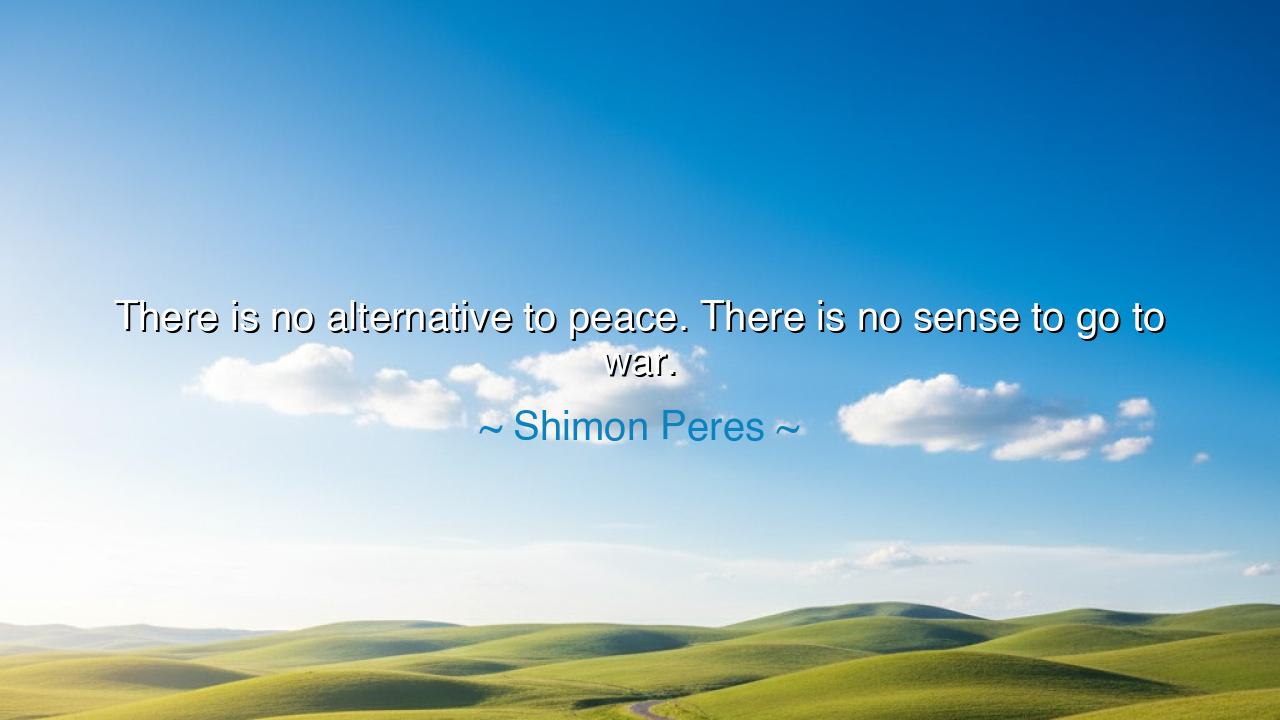
There is no alternative to peace. There is no sense to go to






Hear the voice of Shimon Peres, statesman of Israel and dreamer of reconciliation, who declared: “There is no alternative to peace. There is no sense to go to war.” These words, spoken by a man who knew the fires of conflict and the fragile breath of hope, are not born of naivety but of hard-earned wisdom. They strike with the force of prophecy, for they reveal what all history has taught yet humanity often forgets: that war devours, while peace builds; that war destroys, while peace sustains.
To say there is no alternative to peace is to proclaim peace not as luxury, but as necessity. A nation may survive without riches, without glory, even without greatness—but no nation can survive endlessly without peace. War may erupt with the sound of drums and the pride of banners, but it leaves only silence, ashes, and the lament of widows and children. Peres, who lived through the birth and survival of his nation, understood that the sword may defend, but it cannot sustain. Peace is not one option among many—it is the only soil in which the future can grow.
His words also strike at the futility of war: “There is no sense to go to war.” For war, however justified it may seem at its dawn, reveals its madness at its dusk. The reasons given for war—honor, vengeance, power—vanish beneath the reality of graves and ruins. Peres speaks as one who saw his land scarred by endless conflict, who knew that each victory carried its own sorrow, and who dreamed of a time when nations would not count their strength in weapons, but in children educated, in fields harvested, in songs sung without fear.
History itself stands as witness to his wisdom. Consider the Great War of 1914, which leaders promised would be swift and glorious. Instead, it became a pit of mud and death, a slaughter that devoured a generation. When it ended, the victors claimed triumph, yet within twenty years the seeds of another, greater war had already been sown. The lesson of that century is clear: war may end battles, but only peace ends war. Peres’s words echo this truth—that unless humanity turns deliberately to peace, conflict will rise again like an unquenchable fire.
The emotional power of Peres’s teaching lies in its urgency. He does not present peace as a distant dream, but as an immediate imperative. To postpone peace is to invite death; to seek war is to abandon reason. In his voice we hear both lament and command: lament for the wars that have already scarred generations, command for the future to choose differently. It is not the cry of weakness, but of strength—the strength to imagine a world where swords are laid down and the plow, the book, and the song take their place.
The lesson for us, both as nations and as individuals, is clear: choose peace always, for there is no other path that sustains life. In our homes, in our communities, in our nations, conflict will tempt us. Pride will whisper vengeance, anger will call for retaliation. But the wisdom of Peres teaches that these are illusions, shadows that lead only to ruin. The only true strength lies in reconciliation, in dialogue, in the courage to say, “Enough.”
Practical wisdom follows: in your own life, resist the temptation to escalate quarrels. When anger rises, do not meet it with more anger. Seek first understanding. When wronged, remember that revenge multiplies suffering; forgiveness ends it. Support leaders and policies that strive for dialogue rather than destruction. And in every moment of choice, ask yourself: does this action build peace or deepen conflict? Choose always the path that builds.
So let the words of Shimon Peres echo across generations: “There is no alternative to peace. There is no sense to go to war.” Carve them upon your heart, teach them to your children, live them in your daily life. For in the end, war is always senseless, but peace is always possible. And when humanity learns this fully, then the nations shall no longer march to drums of battle, but to the music of harmony, and the earth itself shall rest.






AAdministratorAdministrator
Welcome, honored guests. Please leave a comment, we will respond soon